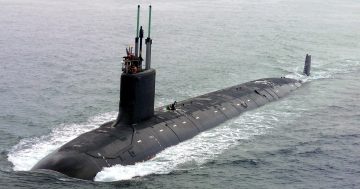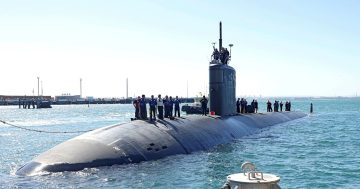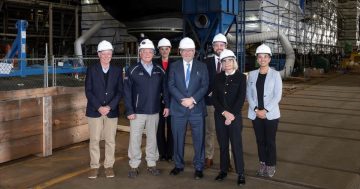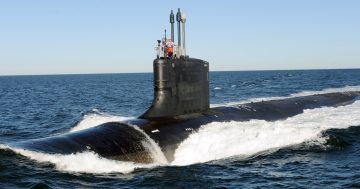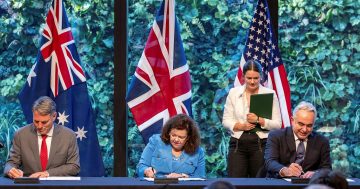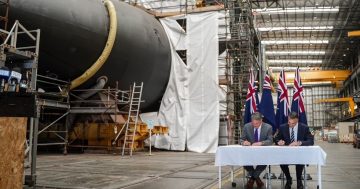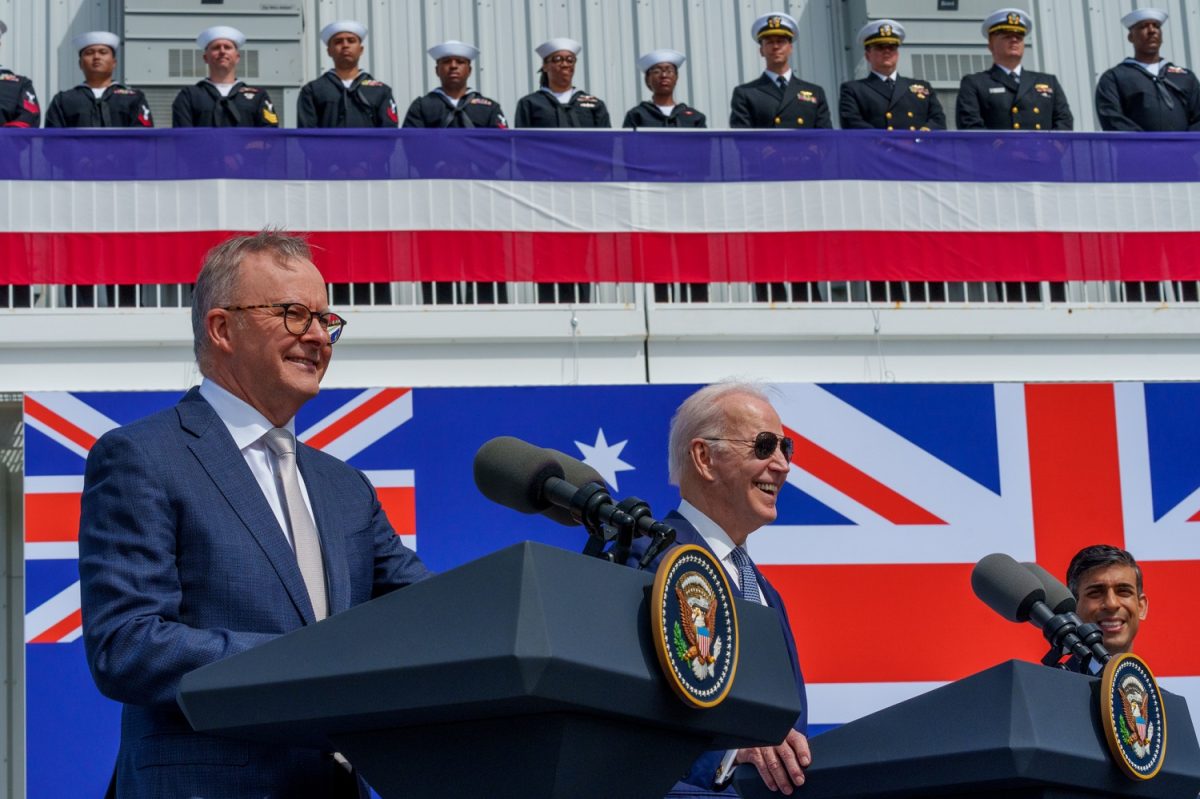
Prime Minister Anthony Albanese, US President Joe Biden and UK PM Rishi Sunak announced the AUKUS submarine arrangement in San Diego in March. Photo: PMO social media.
The US Congress has officially passed its $US874 billion ($A1.3 trillion) 2024 National Defense Authorization Act (NDAA), which includes a number of key legislative elements that will enable Australia’s ambitious nuclear submarine program.
The passing of the bill – effectively its 2023-24 defence budget – by both houses of Congress will see it sent to President Biden for his approval, signing into US law the ability to transfer nuclear and other sensitive US technologies to Australia.
As Region reported on 11 December, the bill includes several key pieces of legislation that will enable:
- The transfer of two US Navy Virginia class submarines to the Royal Australian Navy in 2032 and 2035, and the sale of a new-build Virginia boat in 2038. There is also provision for the sale of two additional Virginia boats in case the follow-on SSN-AUKUS boat program experiences delays. A caveat with this piece of the legislation is that the US President of the day will be required to approve the transfer of a submarine to Australia 270 days before it occurs.
- Authorisation for the maintenance of US Navy submarines by Australian naval and industry personnel in Australia. This is important for the rotational basing of US and UK submarines at HMAS Stirling in Western Australia from 2027 under the Submarine Rotational Force West (SRF-West) program. It also clears the way for a US Navy submarine to undergo a maintenance cycle at HMAS Stirling in 2024 with a combined workforce of US Navy and Australian personnel to perform the work.
- An authorisation for Australian industry personnel to be trained and to work on production and maintenance of US submarines in US shipyards as Australia builds up its own workforce.
- To clear the way for Australia to make a $US3 billion ($A4.5 billion) payment to the US Government to invest in the expansion of the US workforce and supply chain for submarine production at its two major shipyards. This investment, in conjunction with additional US Government funding, is designed to allow the US to increase its production rate from the current 1.2 to a rate of 2.3 submarines a year by 2030.
- The exemption of Australia from US export licencing requirements. With Australia and the UK tightening up their own export licencing legislation, this will allow for the transfer of controlled goods and technology between the AUKUS partners without the need for an export licence.
- An expedited foreign military sales process for technologies of US origin. This will include a pre-approved list of capabilities that will be approved for export within 45 days.
- The addition of Australia and the UK to Title III of the US Defense Production Act, which will incentivise US companies to expand their industrial base for production and the supply of materials and goods, and will allow Australian companies to compete for opportunities with the US Government.
Deputy Prime Minister and Defence Minister Richard Marles said Australia is on the precipice of historic reform that will transform our ability to effectively deter, innovate and operate together.
“The US Congress has provided unprecedented support to Australia in passing the National Defense Authorization Act, which will see the transfer of submarines and streamlined export control provisions, symbolising the strength of our alliance, and our shared commitment to the AUKUS partnership,” he said.
“AUKUS is a game-changer for Australia, the United Kingdom and the United States – the legislation passed by US Congress will enhance our individual and collective capacity to support security, peace, and prosperity in the Indo-Pacific,” he added.
“I thank the United States Congress for their support for AUKUS.”
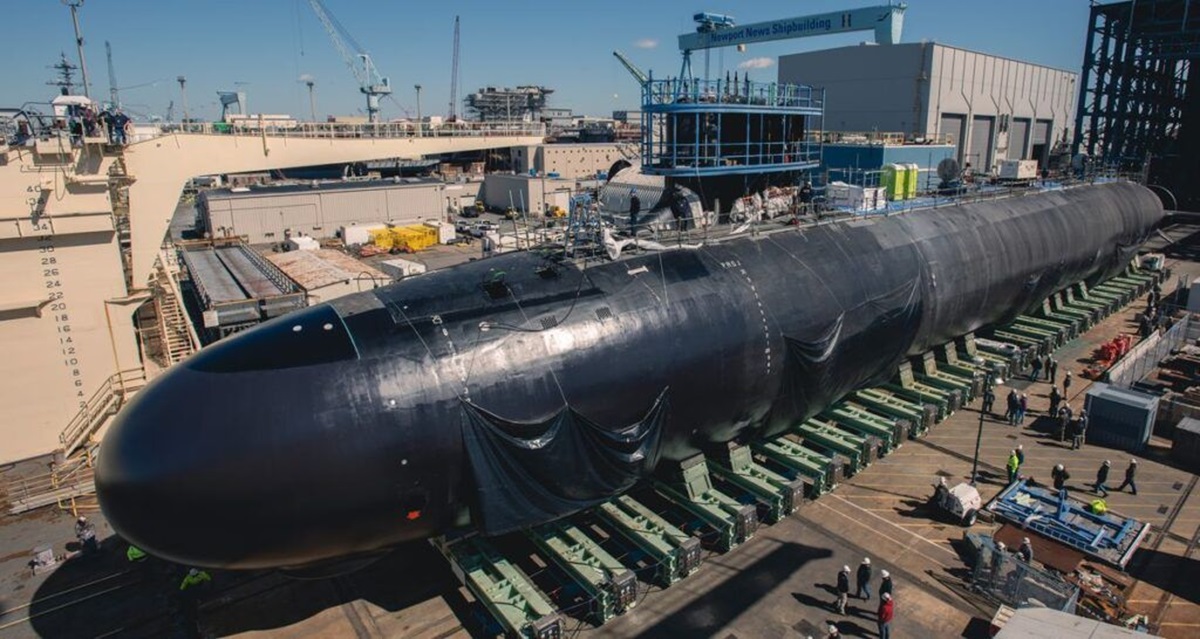
A Virginia class submarine under construction at the Huntington Ingalls shipyard. Image: HII.
Minister for Defence Industry Pat Conroy – who is currently in Washington DC – added, “Australia’s alliance with the United States is unprecedented in scale, scope and significance, underscored by this momentous day for the AUKUS partnership which demonstrates the historic AUKUS agreement is being implemented at pace.
“The Congressional approval of the National Defense Authorization Act brings us closer to realising a generational opportunity to ensure Australia is best equipped to not only protect Australians and their interests but to also support stability and security in the Indo-Pacific.
“Crucially, the passage of the NDAA will revolutionise and enable unprecedented levels of collaboration, scientific, technological and industrial cooperation and co-development and paves the way for Australia to continue to build up its sovereign workforce capacity.”













